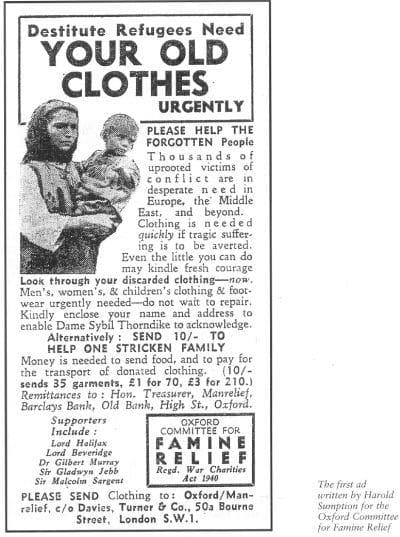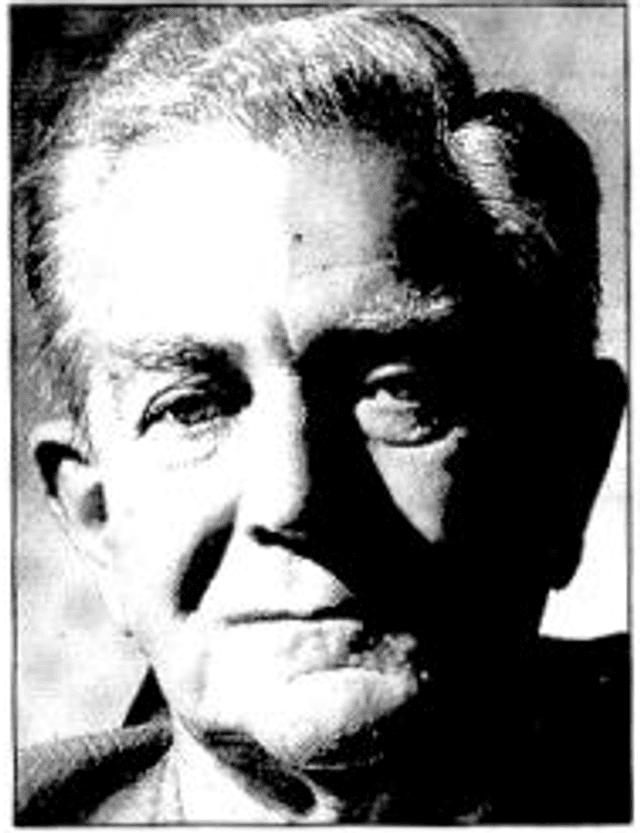The father of modern day fundraising: Harold Sumption
In another of our occasional series, ‘The most brilliant fundraiser I ever met’, founder of SOFII Ken Burnett chats to Joanna Culling about his recollections of Harold Sumption. With additional contributions from Giles Pegram CBE, fundraising consultant, Pierre-Bernard Le Bas, fundraiser and former chair of the International Fundraising Group (now the Resource Alliance) and Per Stenbeck, fundraising consultant and former CEO of The Resource Alliance.
- Written by
- SOFII
- Added
- May 17, 2016
Giles introduces Harold Sumption in 'Yesterday’s trail-blazing and pointers for tomorrow'
Harold Sumption was instrumental in the creation of the innovative fundraising that made Oxfam the largest charity in the UK. He believed in the role of charity as ‘agents’ of the donor in bringing about change. And he believed that fundraising is the process that brings donor and cause together. He profoundly understood the motivations of donors but, as a highly professional advertising man, was able to develop sophisticated techniques to harness those motivations.
Ken on Harold the person…
Harold was a Quaker and he certainly embodied the characteristics of the Quaker movement. He was very self-effacing and unassuming, he wouldn’t push his views on you at all. In fact, you almost had to draw things out of Harold. Which is why the shy pioneer is such a good description. He had very clear views and very firm opinions but he was also very willing to listen and to learn from other people.
I suppose if there is a single word to sum up Harold – it’s probably integrity. He had absolute cast iron integrity. You could trust Harold. He would always be there.
Pierre-Bernard on Harold the person...
Harold was just unique. A real source of inspiration for me at the beginning of my fundraising career. He was an ActionAid board member when I launched the ActionAid French affiliate. He was always encouraging, sharp and so respectful. I will always remember when he invited me to be one of the speakers at the first International Fundraising Workshop. I said ‘I have no experience, why me?’ He said ‘what matters is to be yourself, to be who you are deeply, not what competencies you may or may not have to speak.’ Since then I have always applied this ‘Harold Sumption principle’ to my work. Harold was a visionary, humble. He taught me the most important and overarching fundraising principle: be true, be yourself.
Per on Harold the person...
If ever there was someone who deserves to be called the grand old man of fundraising it was Harold. Harold was my friend and mentor from 1981 when we first met at the first International Fundraising Workshop until he died in 1998. His basic principles of fundraising have been a guiding light for numerous fundraisers around the world.
His expertise in direct mail fundraising was second to none. As an advisor to Oxfam, Harold pioneered many modern fundraising techniques.
Harold taught us, among other things, that fundraising is a three step process: 'Open heart, open mind, open cheque book'. It is still so very true!
Giles on honouring Harold...
At NSPCC, each year, we would elect about 15 people as honorary members of our Council. People who had made a great contribution to our fundraising. Always existing supporters, volunteers, company supporters.
I felt Harold had made such a significant contribution to our fundraising, (not specifically NSPCC’s), that we should make an exception and recognise an outsider. I read the citation to 3,000 supporters at our AGM. I was proud. There was much applause.
There was a lovely certificate, with the Society’s seal. I had it framed. At IFC, I got a small group together, told them what had happened and presented the certificate.
Harold cried.
He was a man of great stature. The photograph of him that we always use makes him seem austere, quite grand and slightly distant.
But at heart he was a very humble, ordinary man.
Ken on his very first meeting with Harold…
I’ll never forget my first meeting with Harold, when I was just 26 years old.
I was the UK director of ActionAid (before it was called that, of course) and Harold had been described to me, so I did know of him. And one day, when I had probably been in the job maybe two or three days, I had a call from Harold. He said, ‘I will come round to see you’. I knew he was quite elderly and not all that well. So I said, ‘No no, I will come to you’. But he was insistent.
On the day of our meeting, I got a phone call from a company in the same building - on the second floor – and they said, ‘there is somebody here to see you but you better come down, because he really isn’t well’.
He’d been climbing the stairs, despite having had very bad lungs and a lot of difficulty with his breathing. Harold was very out of breath from climbing just those first two flights of stairs – and our office was on the fifth floor – but he was determined to get to the top. He had to stop and rest half way up. I was seriously worried about him. He was entirely consumed by the fact that, as far as he was concerned, he was there to help me and there I was, worrying about him.
Of course, over the years I came to know that this sort of caring was very typical of Harold. He was older than my father, very much my senior. He had that an unassuming, supportive air. But even on that first day, I immediately took a liking to him. He was a gentle gentleman with such a great deal of wisdom.
Ken on learning the art of press ads, from the best of the best…

When Harold and I worked together, ActionAid wasn’t a member of the DEC. But if there was a disaster we would advertise as it was a way to recruit a volume of new supporters quite cheaply. So I would contact Harold – we knew we could get an advert in the papers in 24 hours and we would do that by phoning people we knew at The Telegraph or The Guardian. For some reason in those days disasters always seemed to happen at the weekend. I would find myself round in Highgate at Harold’s house and we would sit and write the ad there and then with whatever information or news had come in about the floods or quake. We would craft very simple ads.
Harold had this idea that a press advertisement shouldn’t look expensive. Now, of course, press advertising isn’t used much except in times of emergency because readership has fallen, the cost of advertising has gone up and it doesn’t work so well. But in those days you could get quite a good return from a press advertisement; Harold’s view was that people didn’t know how much the space cost but they did know if it looked expensive. In his view it should look like it was thrown together by two little old ladies at their kitchen table. And I’ve never forgotten that description. I can picture in my mind these two ladies. It taught me a discipline. He was very disciplined. He understood the mind of the donor very well. He got it.
He knew what would work and what wouldn’t. He said if you put a logo in, you are using up space that could be used for the message and people couldn’t care less about the logo and the brand.
But perhaps most importantly, we were taught to be driven by results. Everything was tested. Split tested. He taught me to keep meticulous records. And this is something that I find, these days, people are not rigorous enough about. We used to keep a guard book, these were the days before computers. You had a book with test details, what the weather was like, etc.
Of course, he’d say to you, ‘You’re not the first person to have that idea and last time we tested it, it didn’t work, but you can test it again’. And then you knew that you did so at your own peril. So while he would encourage you to try new things, it would always come back to what he knew had worked the best.
There was no sense of personal bias. Not a matter of opinion. Harold was opposed to that idea of opinion mattering because it was about making a single change and then making a small step forward. He had a simple rule of nothing fancy or flash, no gimmicks, no artificial cleverness. What he thought was clever was being real and getting right to the essence of the issue. So we constructed ads that didn’t look like they would win any awards but they what they did win was fantastic response.
Ken on why Harold’s methods are still relevant today…
Harold is someone that young fundraisers would benefit by discussing and knowing about. They can learn so much from his approach to planning a direct response, numbers driven campaign – and doing so with creativity and integrity together.
One thing Harold instinctively understood, and that many fundraisers have lost sight of, was the joy of giving. He believed people wanted to give. In those days people used to volunteer and Harold believed people wanted to do things. I think he would have been a great supporter of customer care and donor relationship development. He was very much of the generation that you could acquire donors at such a low cost but in those days we were recruiting sponsors at £2 a time. Nowadays you are talking hundreds of pounds. I think Harold would find it intolerable how much fundraising organisations are willing to pay for donors. But he would surely say that if you pay that much for donors, you have to look after them!
Giles on why Harold's methods are still relevant today...
His thinking, at least 50 years old, is being used by many of us to reshape the way we look at fundraising. He was almost certainly the greatest influence on best practice in fundraising today. I am sure that in 50 years’ time it will be the same. He has made a difference to millions of beneficiaries.


















